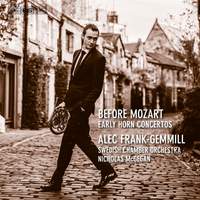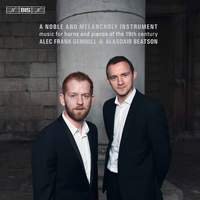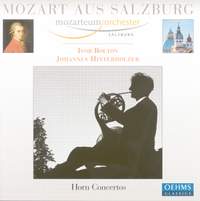Interview,
Alec Frank-Gemmill on Before Mozart
 Mozart's four immortal Horn Concertos are rightly beloved by classical music fans the world over, but aside from the occasional Baroque obbligato most of us are hardly aware of any music for the instrument from the pre-Mozartian era. This is precisely what Alec Frank-Gemmill wants to change - setting out his stall very clearly with the title of his album, entitled simply Before Mozart.
Mozart's four immortal Horn Concertos are rightly beloved by classical music fans the world over, but aside from the occasional Baroque obbligato most of us are hardly aware of any music for the instrument from the pre-Mozartian era. This is precisely what Alec Frank-Gemmill wants to change - setting out his stall very clearly with the title of his album, entitled simply Before Mozart.
Exploring repertoire by Telemann, Haydn and others, it not only traces the history of writing for the horn but indeed some fascinating twists and turns in the evolution of the instrument itself and its technique - at this point still relatively freshly 'tamed' and brought indoors from the world of the hunt.
I spoke to Alec about this disc and some of the unique challenges and rewards of tackling horn music from the time 'Before Mozart'...
The solo part in the Neruda concerto is, as you observe in the sleeve notes, incredibly high by modern standards. It’s hard not to see a parallel with the lost-and-found art of the clarino trumpet – do you think there’s work to be done among the horn world’s early music specialists in rediscovering a vanished technique for these vertigo-inducing lines?
The technique involved in playing so high certainly requires a degree of specialisation. I found that while preparing for the Neruda my low register completely disappeared! (Recording different concertos back-to-back was thus quite a challenge). It would be very exciting if a colleague in the field of early music discovered a specific technique for achieving these notes with greater ease. In the meantime, I am sure there are plenty of dare-devil horn players out there ready to attempt this piece.
Indeed, even setting aside Neruda’s exceptional demands, the average tessitura of a horn concerto seems to have lowered since the era you’re drawing on for this album. Is this connected in some way with the rise of the valved horn, or a mere coincidence?
It is no coincidence but it is quite complicated! In fact the average tessitura for horn concertos went down until the end of the 18th Century, before rising again with the advent of valves. So over time the standard range became lower and then higher, albeit never returning to the stratosphere. The average tessitura initially went down because of the new technique of hand-stopping which took hold from about 1750. This method involved inserting the right hand into the horn's bell in order to increase the chromatic compass of the instrument in the lower register. Composers in the classical period really went to town with this new spectrum of notes, and virtuoso "low horn" ("cor basse") players became the new stars of the instrument. The best example is Giovanni Punto, for whom Beethoven wrote his horn sonata in 1800. When valves were added to the horn the technique of hand-stopping declined and the tessitura rose again.
On your previous release ‘A Noble and Melancholy Instrument’ you made a point of performing on historically-appropriate instruments. Here you’re playing on modern ones – was this an artistic choice (or do the necessary replica instruments from this little-explored period simply not exist…)?
With the previous disc, period horns and pianos enabled us to present standard repertoire in new ways. For Before Mozart, however, the repertoire is far from standard anyway. I am not a purist when it comes to technology and it is great fun playing baroque music on modern horn. My choice was also motivated in part by the idea of helping to expand the canon of solo works beyond Strauss and Mozart. It would be a shame if the concertos by Neruda et al were considered suitable only for performance on period instruments. Played with a good ear for style, they hopefully hold their own on any type of horn. Admittedly, choosing to use valves also avoided the fraught question of which horn (and which techniques) each composer would have expected. Historical horns (and replicas) abound, but matching them to the music with any certainty is next to impossible.
Classical Music’s recent review of this album compares your playing in the Förster concerto favourably to that of Barry Tuckwell, who is surely one of the biggest names in the horn world. Are there any players whose performance style or recordings have particularly influenced you over the years?
Compared to BT I am a mere dilettante. It must have been the playing of the Swedish Chamber Orchestra under Nicholas McGegan's ultra-stylish direction that convinced the reviewer! Actually Tuckwell's exploration of the horn repertoire has been a huge inspiration for me. There are too many other players to mention here though, if I had to, then Anthony Halstead's pioneering performances on the natural horn would be high up on the list. In terms of sound and musicianship it is Dennis Brain who remains my god. Also, if your readers would appreciate tips for further listening: the recordings of Johannes Hinterholzer are incredibly classy, yet remain relatively unknown.
You may have deliberately drawn the focus away from Mozart with this album but that only highlights the elephant in the room (or rather, the absence of elephant) all the more starkly. We can’t let you off the hook: when can we expect to hear your take on the four great Mozart concertos?
Golly! I am rather in awe of various recordings already available of these pieces. The first step is perhaps for me to decide whether to play them with or without valves. When the time (and horn) is right I hope I get to do them. Before then I would appreciate an offer to make a disc called Before Strauss...
Before Mozart: Early Horn Concertos
Alec Frank-Gemmill (horn), Swedish Chamber Orchestra, Nicholas McGegan
'Before Mozart' was released at the end of April on BIS.
Available Formats: SACD, MP3, FLAC, Hi-Res FLAC
Alec Frank-Gemmill and Alasdair Beatson, on a selection of historical instruments, explore the parallel evolutions of the piano and horn up to the present day.
Available Formats: SACD, MP3, FLAC, Hi-Res FLAC
Johannes Hinterholzer (horn), Mozarteum Orchestra Salzburg, Ivor Bolton
Available Formats: MP3, FLAC





